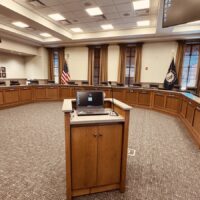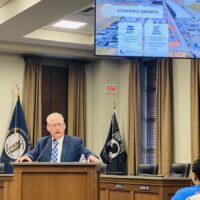Hopkinsville City Council has approved first reading of an ordinance that would do away with partisan elections for mayoral and council races after the 2020 elections.
The 7-4 vote at the council’s Tuesday meeting was as much along racial lines as it was political affiliation, with four of the council’s five black representatives voting against the ordinance. If the measure passes on second reading at the council’s next meeting, on June 2, it would go into effect for the 2022 races.
The council should not pass the measure during the coronavirus crisis, said Ward 1 Councilman Darvin Adams, who questioned the timing since council meetings are being conducted by teleconference and citizens cannot comment in person during a meeting.
Constituents see the measure being done in a “sneaky or unethical way,” said Adams, who had prepared a statement to outline his opposition.
“The city council does not know enough about the particulars of what we’re trying to vote on,” he said.
Ward 12 representative Phillip Brooks and Ward 9 representative Patricia Bell also spoke against the timing of the vote.
“I truly believe this is not a good time mainly because of the pandemic that we’re going through,” Bell said, adding she disagrees the premise of doing away with party identity in local elections.
“If you’re going to be a Democrat, be a Democrat. If you’re going to be a Republican, be a Republican,” she said. “That’s your right. But stop false advertising.”
Adams, Brooks, Bell and Ward 2 representative Kimberly McCarley, all Democrats, voted against the ordinance. Voting in favor were Don Ahart (Ward 3), Paul Henson (Ward 4), Amy Craig (Ward 5), Travis Martin (Ward 6), Terry Parker (Ward 7), Tom Johnson (Ward 8) and Jason Bell (Ward 11). Craig, Martin, Johnson and Jason Bell are Republicans. Ahart, Henson and Parker are Democrats. All of the council members who support the nonpartisan ordinance are white, with the exception of Jason Bell, who is black.
The ordinance was advanced from the April 23 Committee of the Whole meeting, which was also a teleconference session. However, at Tuesday’s council meeting, no one supporting the ordinance commented on the merits of the plan before the vote.
As the meeting wrapped up, Henson did explain his vote. He said he had heard from 34 constituents who support nonpartisan elections and two who opposed the ordinance. “I really had no option,” he said.
Brooks and Adams urged the council to postpone the vote, but that proposal failed by a vote of 6-5. Voting against postponement were Craig, Martin, Parker, Johnson, Ahart and Henson. In favor were Adams, Brooks, McCarley, Patricia Bell and Jason Bell.
Currently, city council candidates run as Republicans, Democrats or Independents and advance from the primaries, where voters cast ballots only in their wards.
Under the nonpartisan ordinance, voters would continue to vote only in their own wards in the primary. The two candidates receiving the most votes in each ward would advance as ward nominees to the general election in November. Voters would then cast ballots citywide in the general election, as they do now in the partisan system.
Brooks warned of a possible scenario where wards would lose their power under the nonpartisan plan.
Primary candidates who are overwhelming choices in their wards could end up losing in the general election, he said. If the council was set on having nonpartisan elections, he said, they should at least amend the ordinance so that any candidate receiving 50 percent or more in the primary election is automatically the winner in the general election.
But City Attorney Doug Willen said state law does not allow that option.
“I have researched that, and we cannot make the change,” Willen said.
Brooks said the nonpartisan ordinance sets up a potential conflict between people living in a ward and people in the city as a whole who could override the choice of the ward. In that situation, people in the ward will feel under-represented, he said.
“That’s where I think there’s a major conflict that I think needs to be addressed that has not been discussed,” he said.
Adams agreed, saying, “It disengages, it disempowers, it weakens the minority vote.”
(Contact information for the council members is listed here.)
Jennifer P. Brown is co-founder, publisher and editor of Hoptown Chronicle. You can reach her at editor@hoptownchronicle.org. Brown was a reporter and editor at the Kentucky New Era, where she worked for 30 years. She is a co-chair of the national advisory board to the Institute for Rural Journalism and Community Issues, governing board past president for the Kentucky Historical Society, and co-founder of the Kentucky Open Government Coalition. She serves on the Hopkinsville History Foundation's board.





